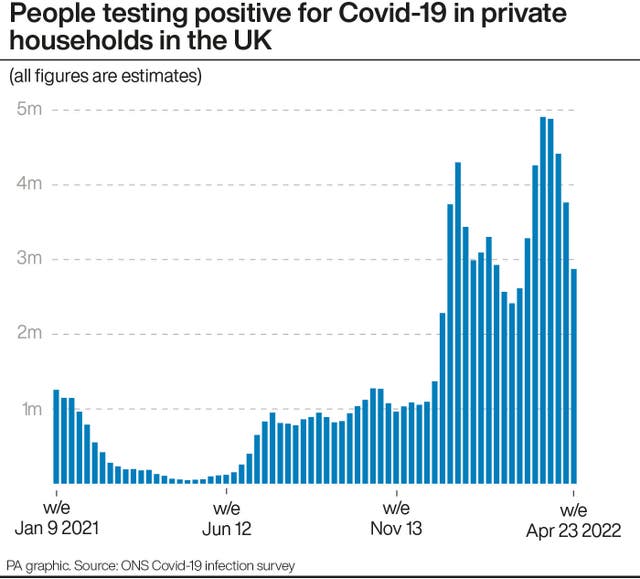Covid-19 infections continue to fall across most of the UK
Prevalence of the virus is the lowest for several weeks.

Covid-19 infections are continuing to fall across most of the UK, though the virus is still circulating at high levels, figures show.
England, Scotland and Wales have all recorded a drop in infections while the trend in Northern Ireland is “uncertain”, according to the Office for National Statistics (ONS).
Across the UK, 2.9 million people in private households are estimated to have had Covid-19 in the week to April 23, down from 3.8 million the previous week.
Total infections in the UK hit a weekly record of 4.9 million in late March.

The figures confirm the surge in Covid-19 driven by the Omicron BA.2 variant is now receding, but prevalence of the virus is high by historic standards.
In England, infections have fallen for the third week running, with 2.4 million people likely to test positive for Covid-19, or around one in 25 – down from 3.2 million, or one in 17.
This is the lowest estimate for infections in England since the beginning of March.
Wales has seen levels drop for the second week in a row, with 172,300 people estimated to have coronavirus, or one in 18 – down from 198,400, or one in 15, and the lowest since early March.
The picture is different in Northern Ireland, where infections have increased slightly, though prevalence of the virus is lower than the other UK nations and the ONS describes the trend as “uncertain”.
Some 74,700 people in Northern Ireland were likely to have had Covid-19 last week, or one in 25, up from 65,300 people, or one in 30.
In Scotland, Covid-19 infections have fallen for the fifth successive week.
Some 218,000 people were estimated to have had the virus in the seven days to April 23, or around one in 25.
This is down from 281,400 people, or one in 19, the previous week, and is the lowest level since early February.
The percentage of people testing positive for Covid-19 in England has decreased in all age groups and regions, the ONS said.
Infections remain highest among people aged 70 and over, with one in 20 likely to have had the virus in the most recent week.
The figures come as the number of people in hospital with Covid-19 in the UK is also on a clear downward trend, having peaked at around the same level that was reached during the first Omicron surge in January.
A total of 13,664 hospital patients were recorded in the UK on April 27, down 22% week-on-week.
Deaths involving Covid-19 are continuing to rise slowly, but remain well below the numbers seen during the first and second waves of the virus.
The ONS infection survey is the most reliable measure of the prevalence of Covid-19 in the UK.
It uses a sample of swab tests collected regularly from tens of thousands of households, and is therefore able to estimate the percentage of people likely to test positive for coronavirus at any point in time, regardless of when they caught the virus, how many times they have had it and whether they have symptoms.
The survey is more representative of the level of Covid-19 in the UK than the number of cases announced each day by the Government, which includes only those who have reported themselves as testing positive, so it is affected by how many people are able to take a test or know they have symptoms.





